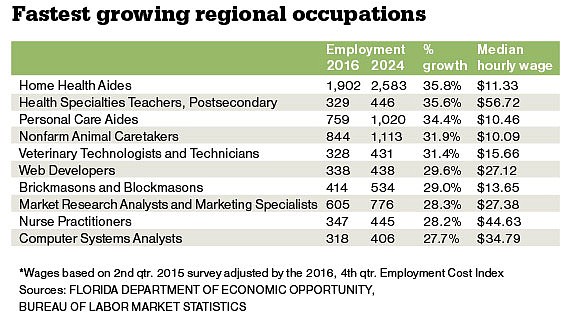- April 5, 2025
-
-
Loading

Loading

Employment data was the topic of the opening presentation at the recent State of Talent Conference hosted by CareerSource Suncoast at the University of South Florida Sarasota-Manatee.
Adrienne Johnston, bureau chief of Labor Market Statistics for the Florida Department of Economic Opportunity, shared insights at the conference about employment statistics in Florida and the region represented by CareerSource Suncoast — Sarasota and Manatee counties.
Statewide, data from the bureau show the majority of private employers have fewer than 250 employees. The largest group of private employers — 17.8% — had 20 to 49 employees. In the state, 8.7% of private employers had more than 1,000 employees.
Johnston also showed attendees data about the top regional occupations in Sarasota and Manatee counties. The top of the list? Retail salespersons, which Johnston says often tops lists in specific regions across the state. The No. 2 spot went to waiters and waitresses. No. 3 on the list was cashiers. Also making the top 10 — registered nurses, nursing assistants and landscaping and groundskeepers.
The list changes considerably when looking at the fastest growing regional occupations. This list shows job growth projected out for 2024, and, not surprising given demographic trends, it skews to health care professions. Home health aides take the No. 1 spot, personal care aides take the third spot and nurse practitioners take the ninth spot.
The State of Talent Conference was held May 19 at the University of South Florida Sarasota-Manatee campus. In addition to Johnston, speakers on the schedule included human resources executives from FCCI Insurance Group; impact-resistant window and door manufacturer PGT Industries; and Design Concepts/Marine Concepts, a composite tooling and design manufacturer.
Another key topic covered at the conference was the importance of mentoring interns and new hires. Robert Shindell, president and CEO of Intern Bridge, an experiential education research and consulting firm, told attendees that companies tend to frame mentoring from the perspective of the mentor, not the mentee.
But he says research about next-generation employees shows the vast majority want their boss to serve as a coach or mentor. To connect with interns or new hires, other employees should acknowledge they value their ideas, make genuine connections that go beyond technology and offer input and feedback.
Shindell also says employers must make a shift to focus on the needs of the mentee. Employers, he says, should build a mentoring model, systematize the process and have mentees be involved in the design of the internship, so they can be engaged in their own learning process.